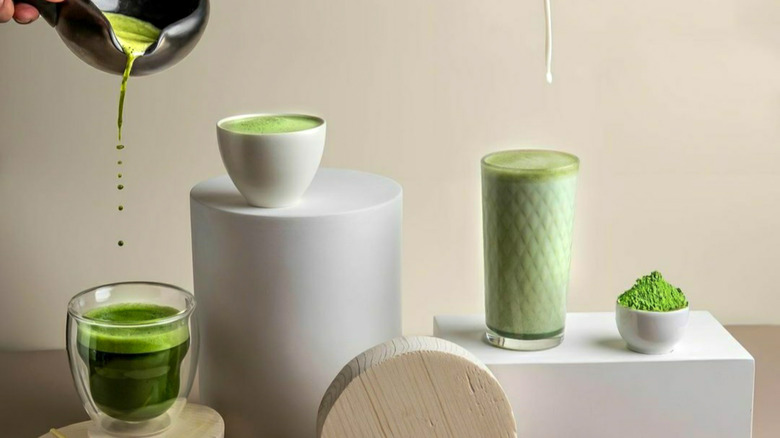What's The Difference Between Green Tea And Matcha?
You may have heard that green tea offers many health benefits, including weight loss and antioxidant actions (via Healthline). Matcha tea confers many of the same benefits as regular green tea, but there are some differences between the two (per WebMD). According to the Art of Tea, both come from the Camellia Sinensis plant. So what's the difference between green tea and matcha? First, matcha and green tea are grown and processed differently.
Green tea is entirely sun-grown, while matcha is cultivated in the shade for three weeks before harvest. Growing matcha in the shade increases the amount of chlorophyll in the leaves, giving them a bright green color. Standard green tea leaves appear more muted, with tones of brown. Green tea cultivators use machines to harvest and dry the leaves and package them as loose tea or in tea bags.
Matcha growers hand-pick the best leaves from the plant, remove stems and veins from the leaves, then stone-grind them into a powder. Green tea has a clear, light appearance and flavor with grassy, slightly bitter undertones. Matcha has a richer, sweeter taste and an opaque appearance.
Benefits of green tea versus matcha tea
Healthline says green tea contains antioxidants that can boost brain function, aid fat loss, protect against heart disease, and even lower cancer risk. A 2017 study in the Journal of Ethnopharmacology found that the catechin epigallocatechin gallate (EGCG) gives green tea many of its medicinal benefits, including protection from various health conditions, including diabetes, heart attack, hypertrophic cardiomyopathy (HCM), inflammation, and atherosclerosis.
And Healthline explains that green tea also contains polyphenols that help protect against cancer and inflammation, along with caffeine and l-theanine. A 2021 study in the Journal of Medicinal Food confirmed that l-theanine can boost mood, relieve stress, and promote normal sleep. But it can also improve attention, working memory, and executive function in the brain.
According to Healthline, matcha contains these same benefits, but since it is a concentrated form of green tea, it contains even more compounds than green tea. In fact, another 2021 study published in Applied Sciences found that matcha contains up to ten times more antioxidants than regular green tea. This means matcha may have even more health benefits than green tea, but Healthline warns against drinking more than two cups per day of the super-powered tea.


